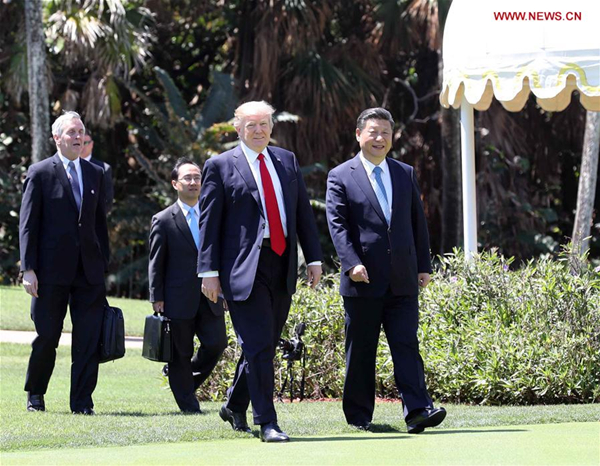China-US trade relations expected to strengthen during Trump's visit
- By Guo Yiming
 0 Comment(s)
0 Comment(s) Print
Print E-mail China.org.cn, November 7, 2017
E-mail China.org.cn, November 7, 2017
 |
|
Chinese President Xi Jinping (R, Front) and his U.S. counterpart Donald Trump (L, Front) take a walk to further discuss bilateral cooperation issues in the Mar-a-Lago resort in Florida, the United States, April 7, 2017. [Photo/Xinhua] |
The China-U.S. trade relations are expected to strengthen from the upcoming state meeting, said officials and experts ahead of U.S. President Donald Trump's first state visit to China.
Representatives from about 40 U.S. companies are expected to join with Trump during his China visit from Nov. 8 to 10 in what Chinese Ambassador to the U.S. Cui Tiankai called a "state visit-plus," including talks, a military honor guard and a formal banquet, and other special arrangements for the U.S. president.
"The two countries are expected to host a series of trade-related events and sign some business cooperation agreements," said Fu Ziying, China's international trade representative and vice minister of the Ministry of Commerce, during a press briefing on Nov. 2 in Beijing. "We have already reached consensus on some aspects and are striving to make achievements in terms of economy and trade, as well as the next stage of China-U.S. cooperation."
Many experts agree that relations between the world's two largest economies have been on an increasingly stable path since the Trump administration took office. The two presidents have exchanged nine phone calls and held two meetings by the end of last month.
Trade and North Korea's nuclear weapons development will be the top two issues on the agenda during the summit meeting, according to U.S.-China Business Council President John Frisbie.
"American companies hope to see more concrete implementation of China's economic reforms and openings following the 19th CPC National Congress, as this would send a positive signal about China's policy direction and strengthen the U.S.-China commercial relationship at this important time," Frisbie said in an email.
President Xi Jinping has made renewed commitment to economic opening up and win-win cooperation while safeguarding the country's sovereignty, security and development interests, during a recent meeting with members of the Advisory Board of Tsinghua University School of Economics and Management. The members include foreign and Chinese entrepreneurs, academics and former officials.
In response to the U.S. concern of imbalanced trade, Fu said that the situation is caused by the different economic structures of the U.S. and China, the different industrial distribution of the two countries, and the international division of labor.
"It also derives from the two countries' statistical systems, which inevitably contain statistical errors and have different methods of calculating entrepot trade factors," Fu also pointed out that the U.S. controls over high technology equipment sales is also an important reason for the imbalance.
Nevertheless, top-level communication between the two countries has been quite smooth, said Zheng Zeguang, China's vice foreign minister, at a Nov. 3 press briefing in Beijing.
Zheng said, "The two leaders are expected to take advantage of their meeting in Beijing to discuss issues of common interests, strengthen understanding and friendship based on the consensus made during their meetings at the Mar-a-Lago estate and the G20 summit in Hamburg this year."
China is the second largest export market for the U.S. after North America, and it is also one of the fastest-growing markets. In the past 10 years, the growth of U.S. exports to China reached 11 percent every year, which exceeded the 4 percent average growth of the total exports of the U.S. in the same period, he said.
"China-U.S. trade relations are mutually beneficial in nature and has brought huge benefits to the two countries and their people," Zheng said.
Running trade surplus is a common stage in the process of industrialization in the context of globalization, and the U.S. trade deficit with China has gradually decreased over the past years, according to a report on China-U.S. economic and trade relations issued by China's Ministry of Commerce this year.
The report also said that balancing trade requires the joint efforts of both sides: China will continue to expand imports from the U.S., while the U.S. should also relax control on its exports to China and create opportunities to expand export of high-tech products to China.
During the 19th National Congress of the CPC, President Xi said China will continue to deepen supply-side structural reform, open further to the outside, adopt more sophisticated measures to boost trade and investment facilitation, and expand market access.
Zheng said this will create more space for mutually beneficial cooperation between China and the U.S. as well as with the rest of the world.
The vice foreign minister called for a global perspective and systematic approach to seeing the China-U.S. trade imbalance.





